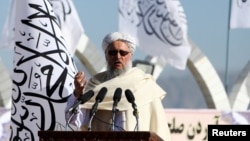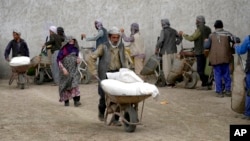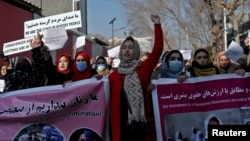Afghanistan’s ruling Taliban unveiled their first annual budget Saturday. Officials said it will be fully funded by domestic revenues and faces a fiscal deficit of 44 billion Afghanis, or nearly $500 million.
Deputy Prime Minister Abdul Salam Hanafi told a news conference in Kabul that his interim government foresees spending of 231.4 billion Afghanis ($2.6 billion) and estimates domestic revenues of 186.7 billion Afghanis this financial year. He did not explain how the gap between proposed spending and expected revenues will be bridged.
“The entire budget, including spending on education, health, development, defense or other sectors, will be funded by our national revenue sources without any foreign contributions,” Hanafi said.
He added that 27.9 billion Afghanis ($0.33 billion) would be spent on development projects.
“Our maximum focus and attention will be on how to pave the way to bring education to each and every corner of the country so our children can receive quality education, including technical education and higher education,” Hanafi said.
A finance ministry spokesman explained that revenues are collections from departments related to customs, ministries and mines. The budget runs to February 2023.
The formerly insurgent Taliban seized power from the now defunct Western-backed Afghan government in mid-August 2021. The last U.S.-led foreign troops withdrew from Afghanistan on August 30, 2021, ending nearly two decades of war with the Islamist group.
Successive governments in Kabul mostly relied on foreign financial assistance, but the Taliban takeover prompted the United States and other Western donor nations as well as institutions to immediately halt the flow of aid to Afghanistan.
The aid suspension and other financial sanctions have almost choked the Afghan banking system, deteriorating an already bad humanitarian crisis and pushing the country to the brink of an economic meltdown.
The international community has not yet recognized the Taliban government, citing a lack of political inclusivity, curbs on women’s rights and terrorism-related concerns.
The United Nations says more than half the country’s estimated 40 million people need assistance. International aid groups are still trying to figure out how to urgently help Afghans without giving the Taliban direct access to funds.
The ruling Islamist group is also under intense domestic and international criticism for its increasing restrictions on Afghan women’s rights despite repeated public pledges not to do so.
On Sunday, the hard-line group decreed that Afghan women must be covered from head to toe, including their faces, in public, drawing international outrage and condemnation. The move follows curbs in place on women, limiting their ability to work and travel. The Taliban have not yet allowed all girls to return to school.
On Thursday, foreign ministers of the Group of Seven (G-7) criticized the Taliban rulers for increasing restrictions on the rights of Afghan women and girls.
"With these measures, the Taliban are further isolating themselves from the international community,” said the G-7 foreign ministers and the European Union foreign policy chief in a joint statement.
They called on the Taliban to take urgent action to ease these curbs and respect the human rights of all Afghans.
The Islamist group justifies the restrictions, saying they are in accordance with Islam and Afghan culture.
Some information for this story came from Reuters.






